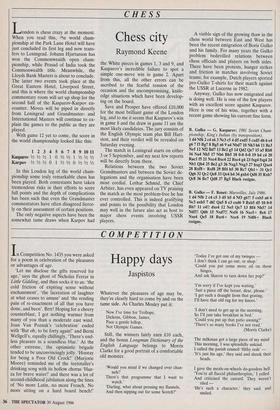CHESS
London is chess crazy at the moment. When you read this, the world cham- pionship at the Park Lane Hotel will have just concluded its first leg and now trans- fers to Leningrad. Johann Hjartarson has won the Commonwealth open cham- pionship, while Prasad of India took the Commonwealth title. Meanwhile, the Lloyds Bank Masters is about to conclude. The latter two events took place at the Great Eastern Hotel, Liverpool Street, and this is where the world championship commentary room will set up shop for the second half of the Kasparov-Karpov en- counter. Moves will be piped in directly from Leningrad and Grandmasters and International Masters will continue to ex- plain the games to the public as they are played.
With game 12 yet to come, the score in the world championship looked like this: 1 2 3 4 5 6 7 8 9 10 11 ICasparov 1/2 1/2 1/2 1 0 1/2 V2 1 1/2 1/2 1/2 Karpov 1/2 1/2 1/2 0 1 1/2 1/2 0t/ 1/2 1/2 In this London leg of the world cham- pionship some truly remarkable chess has been played. Both contestants have taken tremendous risks in their efforts to score full points and the depth of complications has been such that even the Grandmaster commentators have often disagreed fierce- ly on their assessment of certain positions.
The only negative aspects have been the somewhat tame draws when Karpov had
Chess city
Raymond Keene
the White pieces in games 1, 3 and 9, and Kasparov's incredible failure to spot a simple one-move win in game 2. Apart from this, all the other errors can be ascribed to the fearful tension of the occasion and the uncompromising, knife- edge situations which have been develop- ing on the board.
Save and Prosper have offered £10,000 for the most brilliant game of the London leg, and to me it seems that Kasparov's win in game 8 and the draw in game 11 are the most likely candidates. The jury consists of the English Olympic team plus Bill Hart- ston, and their verdict will be revealed on Saturday evening.
The match in Leningrad starts on either 3 or 5 September, and my next few reports will be directly from there.
Relations between the two Soviet Grandmasters and between the Soviet de- legations and the organisation have been most cordial. Lothar Schmid, the Chief Arbiter, has even appeared on TV praising the match as the most problem-free he has ever controlled. This is indeed gratifying and points to the possibility that London may well in the future also act as host to major chess events involving USSR players. A visible sign of the growing thaw in the chess world between East and West has been the recent emigration of Boris Gulko and his family. For many years the Gulko problem bedevilled relations between chess officials and players on both sides. There have been protests, hunger strikes and friction in matches involving Soviet teams; for example, Dutch players sported pro-Gulko T-shirts for their match against the USSR at Lucerne in 1982.
Anyway, Gulko has now emigrated and is doing well. He is one of the few players with an excellent score against Kasparov. Here is one of his wins, together with a recent game showing his current fine form.
B. Gulko — G. Kasparov: 1981 Soviet Cham- pionship; King's Indian (by transposition).
1 d4 Nf6 2 c4 e6 3 Nc3 c5 4 d5 exd5 5 cxd5 d6 6 e4 g6 7 f3 Bg7 8 Bg5 a6 9 a4 Nbd7 10 Nh3 h6 11 Be3 Ne5 12 Nf2 Bd7 13 Be2 g5 14 Qd2 Qe7 15 a5 Rb8 16 Na4 Nh5 17 Nb6 Bb5 18 0-0 0-0 19 b4 c4 20 Racl f5 21 Nxc4 Bxc4 22 Bxc4 g4 23 fxg4 fxg4 24 Nhl Qh4 25 Be2 g3 26 Nxg3 Nxg3 27 hxg3 Qxe4 28 RxfS+ Rxf8 29 Bf4 h5 30 Rc7 Qb1+ 31 Qcl Qg6 32 Qc2 Qe8 33 Qe4 h4 34 014 Qd8 35 Rxb7 Qc8 36 Re7 Qd8 37 Bg5 Black resigns.
B. Gulko — F. Renet: Marseilles, July 1986.
1 d4 Nf6 2 c4 c5 3 d5 b5 4 N13 g6?! 5 cxb5 a6 6 Nc3 axb5 7 d6! Qa5 8 e3 exd6 9 BxbS d5 10 0-0 Bb7 11 e4!! dxe4 12 Ne5 Qc7 13 Bf4 Nh5? 14 Nd5!! Qd6 15 Nxd7!! Nxf4 16 NxcS+ Bc6 17 Nxe4 Qe5 18 Bxc6+ Nxc6 19 Ndf6+ Black resigns.








































 Previous page
Previous page